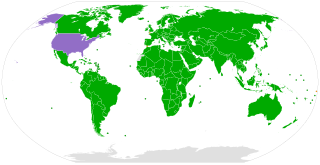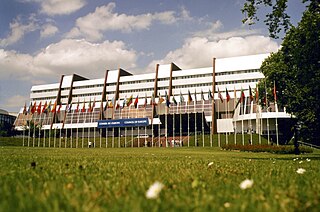Related Research Articles

The Council of Europe is an international organisation founded in the wake of World War II to uphold human rights, democracy and the rule of law in Europe. Founded in 1949, it has 46 member states, with a population of approximately 675 million; it operates with an annual budget of approximately 500 million euros.

The European Convention on Human Rights is an international convention to protect human rights and political freedoms in Europe. Drafted in 1950 by the then newly formed Council of Europe, the convention entered into force on 3 September 1953. All Council of Europe member states are party to the Convention and new members are expected to ratify the convention at the earliest opportunity.

The Vienna Convention on Diplomatic Relations of 1961 is an international treaty that defines a framework for diplomatic relations between independent countries. Its aim is to facilitate "the development of friendly relations" among governments through a uniform set of practices and principles; most notably, it codifies the longstanding custom of diplomatic immunity, in which diplomatic missions are granted privileges that enable diplomats to perform their functions without fear of coercion or harassment by the host country. The Vienna Convention is a cornerstone of modern international relations and international law and is almost universally ratified and observed; it is considered one of the most successful legal instruments drafted under the United Nations.

The United Nations Convention on the Rights of the Child is an international human rights treaty which sets out the civil, political, economic, social, health and cultural rights of children. The convention defines a child as any human being under the age of eighteen, unless the age of majority is attained earlier under national legislation.
The BernConvention on the Conservation of European Wildlife and Natural Habitats, also known as the Bern Convention, is a binding international legal instrument in the field of Nature Conservation, it covers the natural heritage in Europe, as well as in some African countries. The Convention was open for signature on 19 September 1979 and came into force on 1 June 1982. It is particularly concerned about protecting natural habitats and endangered species, including migratory species.
A fair trial is a trial which is "conducted fairly, justly, and with procedural regularity by an impartial judge". Various rights associated with a fair trial are explicitly proclaimed in Article 10 of the Universal Declaration of Human Rights, the Sixth Amendment to the United States Constitution, and Article 6 of the European Convention of Human Rights, as well as numerous other constitutions and declarations throughout the world. There is no binding international law that defines what is not a fair trial; for example, the right to a jury trial and other important procedures vary from nation to nation.
The Lisbon Recognition Convention, officially the Convention on the Recognition of Qualifications concerning Higher Education in the European Region, is an international convention of the Council of Europe elaborated together with the UNESCO. This is the main legal agreement on credential evaluation in Europe.
Customary international law is an aspect of international law involving the principle of custom. Along with general principles of law and treaties, custom is considered by the International Court of Justice, jurists, the United Nations, and its member states to be among the primary sources of international law.

The Committee of Ministers of the Council of Europe or Committee of Ministers is the Council of Europe's decision-making body. It comprises the Foreign Affairs Ministers of all the member states, or their permanent diplomatic representatives in Strasbourg. It is both a governmental body, where national approaches to problems facing European society can be discussed on an equal footing, as well as a collective forum, where Europe-wide responses to such challenges are formulated. In collaboration with the Parliamentary Assembly, it is the guardian of the Council's fundamental values; it monitors member states' compliance with their undertakings.

The Vienna Convention on Consular Relations is an international treaty that defines a framework for consular relations between sovereign states. It codifies many consular practices that originated from state custom and various bilateral agreements between states.

The Group of States against Corruption, the Council of Europe’s anti-corruption monitoring body with its Headquarters in Strasbourg (France), was established, in 1999, as an enlarged Partial Agreement by 17 Council of Europe member States.
The Commissioner for Human Rights is an independent and impartial non-judicial institution established in 1999 by the Strasbourg-based Council of Europe, to promote awareness of and respect for human rights in the council's 46 member states. The activities of Commissioner focus on three major, closely related areas:

The European Directorate for the Quality of Medicines & HealthCare (EDQM) is a Directorate of the Council of Europe that traces its origins and statutes to the Convention on the Elaboration of a European Pharmacopoeia.
Additional Protocol to the Convention on Cybercrime, concerning the criminalisation of acts of a racist and xenophobic nature committed through computer systems is an additional protocol to the Council of Europe Convention on Cybercrime. This additional protocol was the subject of negotiations in late 2001 and early 2002. Final text of this protocol was adopted by the Council of Europe Committee of Ministers on 7 November 2002 under the title "Additional Protocol to the Convention on cybercrime, concerning the criminalisation of acts of a racist and xenophobic nature committed through computer systems, ("Protocol"). The Protocol opened on 28 January 2003 and entry into force is 1 March 2006. As of July 2017, 29 States have ratified the Protocol and a further 13 have signed the Protocol but have not yet followed with ratification.

The Council of Europe was founded on 5 May 1949 by ten western and northern European states, with Greece joining three months later, and Iceland, Turkey and West Germany joining the next year. It now has 46 member states, with Montenegro being the latest to join.

The European Convention for the Protection of Animals kept for Farming Purposes, also known as the Farm Animal Convention, is an animal welfare treaty of the Council of Europe, adopted on 10 March 1976 in Strasbourg, and effective since 10 September 1978.

The European Convention for the Protection of Animals for Slaughter, also known as the Slaughter Convention, is an animal welfare treaty of the Council of Europe, adopted on 10 May 1979 in Strasbourg, and effective since 11 June 1982. It establishes ethical standards pertaining to animal slaughter, such as stunning.

The European Convention for the Protection of Vertebrate Animals used for Experimental and other Scientific Purposes, sometimes simply referred to as the animal experimentation convention or laboratory animals convention, is an animal welfare treaty of the Council of Europe regarding animal testing, adopted on 18 March 1986 in Strasbourg, and effective since 1 January 1991.

Armenia has been a member of the Council of Europe, an international organization that focuses on strengthening democracy, human rights, and the rule of law across Europe, since 2001.
References
- ↑ CAHDI website Archived 6 March 2008 at the Wayback Machine
- ↑ Bell, Imogen (2002). Central and South-Eastern Europe 2003. Routledge. p. 720. ISBN 1-85743-136-7.
- ↑ Rosenstiel, Francis; Lejard-Boutsavath, Edith; Martz, Jean-Jacques (2002). European Yearbook 2000. Martinus Nijhoff Publishers. p. 76. ISBN 90-411-1844-6.
- ↑ State Practice Regarding State Succession and Issues of Recognition, 1999, ISBN 90-411-1203-0
- ↑ State Immunities Database with related country profiles Archived 19 January 2008 at the Wayback Machine
- ↑ State Practice regarding State Immunities, Gerhard Hafner, Marcelo G. Kohen and Susan Breau, 2006, ISBN 90-04-15073-0
- ↑ International Courts and Tribunals
- ↑ Yearbook of the European Convention on Human Rights 1991. Council of Europe. 1994. ISBN 0792329163 . Retrieved 26 September 2009.
- ↑ For example: Implications of the European Convention on Human Rights for the development of public international law, 2000, ISBN 92-871-4290-4 and Treaty Making – Expression of Consent by States to be Bound by a Treaty, 2001, ISBN 90-411-1692-3
- ↑ Organisation and functions of the Office of Legal Adviser in the Ministry for Foreign Affairs Archived 19 January 2008 at the Wayback Machine
- ↑ ETS 023. Conventions.coe.int. Retrieved on 3 January 2012.
- ↑ ETS 061. Conventions.coe.int. Retrieved on 3 January 2012.
- ↑ ETS 061A. Conventions.coe.int (4 October 2006). Retrieved on 3 January 2012.
- ↑ ETS 061B. Conventions.coe.int (4 October 2006). Retrieved on 3 January 2012.
- ↑ ETS 063. Conventions.coe.int. Retrieved on 3 January 2012.
- ↑ ETS 074. Conventions.coe.int. Retrieved on 3 January 2012.
- ↑ ETS 074A. Conventions.coe.int. Retrieved on 3 January 2012.
- ↑ Resolution (64) 10 Archived 19 June 2005 at the Wayback Machine
- ↑ Resolution (68) 17 Archived 19 June 2005 at the Wayback Machine